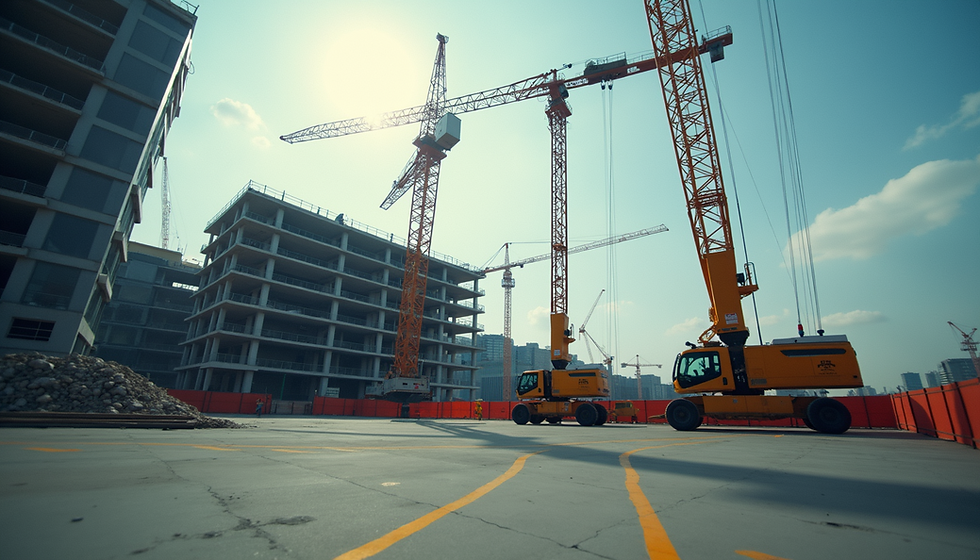How to Plan and Execute a New Construction Project
- hoomanmirloo
- Sep 29, 2025
- 4 min read
Planning and executing a construction project can be a complex and demanding task. Whether you are building a residential home, a commercial building, or an industrial facility, the process requires careful coordination, clear communication, and thorough preparation. This guide will walk you through the essential steps to ensure your construction project runs smoothly from start to finish.
Understanding the Basics of Construction Projects
Before diving into the specifics, it is important to understand what a construction project entails. Construction projects involve multiple phases, including design, permitting, procurement, construction, and closeout. Each phase has its own set of challenges and requirements.
Key components of construction projects include:
Project Scope: Defining what will be built, including size, materials, and features.
Budget: Estimating costs and securing financing.
Timeline: Setting realistic deadlines for each phase.
Team: Hiring architects, engineers, contractors, and subcontractors.
Permits and Regulations: Ensuring compliance with local building codes and laws.
A well-organized plan helps avoid costly delays and ensures quality results.

Steps to Plan Successful Construction Projects
Planning is the foundation of any successful construction project. Here are the critical steps to follow:
1. Define Your Project Goals and Requirements
Start by clearly outlining what you want to achieve. Consider the purpose of the building, the number of rooms or units, special features, and sustainability goals. This clarity will guide all future decisions.
2. Conduct a Site Analysis
Evaluate the location where the construction will take place. Check soil quality, topography, access to utilities, and environmental restrictions. This information is vital for design and budgeting.
3. Develop a Detailed Budget
Create a comprehensive budget that includes materials, labor, permits, equipment, and contingency funds. Be realistic and allow for unexpected expenses.
4. Assemble Your Team
Hire experienced professionals such as architects, engineers, and contractors. Verify their credentials.
5. Obtain Necessary Permits
Apply for all required permits from local authorities. This step can take time, so start early to avoid delays.
6. Create a Project Schedule
Develop a timeline that outlines each phase of construction. Include milestones and deadlines to track progress.
7. Plan for Safety and Quality Control
Implement safety protocols and quality checks throughout the project to protect workers and ensure standards are met.
By following these steps, you set a strong foundation for your construction project.

What are the upcoming projects?
Staying informed about upcoming construction projects can provide valuable insights and opportunities. Many regions have public records or industry reports listing planned developments. These projects range from residential complexes to commercial centers and infrastructure improvements.
For example, a city might announce a new mixed-use development that includes retail spaces, offices, and apartments. Knowing about such projects can help contractors, suppliers, and investors prepare and position themselves strategically.
Additionally, industry events and trade publications often highlight trends and upcoming projects. Networking with professionals in the field can also reveal insider information.
Keeping an eye on upcoming projects allows you to anticipate market demands and adjust your plans accordingly.

Executing Your Construction Project Efficiently
Once planning is complete, execution begins. This phase requires close management and communication to keep everything on track.
1. Mobilize Resources
Ensure all materials, equipment, and personnel are ready and available on-site. Delays in mobilization can push back the entire schedule.
2. Monitor Progress Regularly
Use project management tools to track daily progress against the schedule. Hold regular meetings with your team to address issues promptly.
3. Manage Changes Carefully
Changes in design or scope are common but can impact budget and timeline. Evaluate each change request thoroughly before approval.
4. Maintain Quality Standards
Conduct inspections and tests at key stages to ensure work meets specifications. Address defects immediately to avoid costly rework.
5. Ensure Safety Compliance
Enforce safety rules and provide training to prevent accidents. A safe site protects workers and reduces liability.
6. Communicate Transparently
Keep all stakeholders informed about progress, challenges, and changes. Clear communication builds trust and facilitates problem-solving.
By focusing on these execution strategies, you can minimize risks and deliver your project successfully.
Tips for Managing Costs and Avoiding Delays
Cost overruns and delays are common challenges in construction projects. Here are some practical tips to manage these risks:
Plan Thoroughly: Detailed planning reduces surprises.
Choose Reliable Contractors: Vet contractors carefully to ensure competence.
Use Technology: Project management software can improve scheduling and communication.
Order Materials Early: Avoid supply chain delays by ordering materials in advance.
Monitor Cash Flow: Keep track of expenses and payments to avoid financial bottlenecks.
Prepare for Weather: Account for seasonal weather conditions that may affect construction.
Document Everything: Maintain records of contracts, changes, and communications.
Implementing these tips helps keep your project on budget and on time.
Final Thoughts on Construction Project Success
Successfully planning and executing a construction project requires dedication, organization, and flexibility. By understanding the phases, assembling the right team, and maintaining clear communication, you can navigate challenges effectively.
For those interested in exploring new construction projects, partnering with experienced professionals can make a significant difference. Their expertise ensures your vision becomes a reality with quality and efficiency.
Remember, every construction project is unique. Tailor your approach to fit your specific goals and circumstances for the best results.





Comments